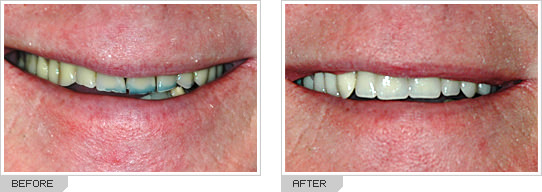Dentures, or false teeth as they are often called, are a way of replacing lost teeth and gums.
They are removable and need to be taken out for cleaning. The dentures are made by a specialist technician from impressions and wax moulds that the dentist prepares.
What different types are there?
Dentures can be made entirely of plastic (acrylic dentures) or as plastic on a cast metal base (cobalt chrome dentures). They can be used to replace one or more teeth (a partial denture) or all of the teeth (a full denture). Dentures can sit passively against the natural teeth or they can be clasped to them to make them fit better. In some cases dentures can be attached to implants in the jaw to stabilise them even more (implant retained dentures). This type of denture is very useful when the jawbone has worn away and there is very little left to support the denture. When the natural teeth have become very worn down or decayed the dentures can be fitted over the roots of the teeth, which can help to give it greater support (an over denture).
Why do I need to change my existing dentures?
On average a set of full dentures will last from between five to ten years. Over this time the jaw bone (or ridge) that the denture sits on will remodel and change shape. This remodelling means the dentures will no longer fit as well and will start to become loose. At the same time the acrylic teeth will have become worn down, which will cause the bite to change. The effect of these gradual changes is for the lower part of the face and cheeks to sag in, which can age a patient dramatically. New dentures will be better fitting, which can give patients a much better feeling of comfort and will allow them to chew their food better. They can also rejuvenate the smile and give patients a great sense of confidence.
Can you make them look natural?
Partial dentures should be able to blend in seamlessly with the rest of the teeth whilst full dentures should look like a great smile and never like a set of piano keys! At StoneRock the dentists take great care to select the right mould and shape of tooth to give the most natural appearance possible. The teeth are tried in wax first so that we have a chance to move them around and change them as we please. Once everyone is happy that the smile is exactly as they want it, the finished denture is created.
Will I have to use a fixative?
Where possible we hope that a denture can be worn with out using fixatives of any type. Sometimes, however, where the ridge supporting the denture is very flat, some fixative is usually required. Good fitting, well designed dentures will always need the least amount of fixative and this means the minimum of mess for the patient.
What are my alternatives?
In modern dentistry there are three ways of replacing teeth. They are dentures, bridges or implants. A bridge is fixed to the teeth on either side of the gap, and can be used to replace one or two teeth. Bridges can be considered only if the supporting teeth are strong enough to do the extra work. An implant is a metal screw placed into the jawbone that supports one or more crowns. These are an excellent way of replacing teeth if there is enough bone present. Implants work best at the front of the mouth but can be less successful in smokers.
How long will I have to wait for my dentures?
Typically, dentures take four to six weeks to make with visits every one to two weeks. Each visit lasts from 30 minutes to an hour depending on how long is needed to design the smile. When we are replacing front teeth we always recommend a spare denture, as this is very reassuring to patients if the denture is lost or broken.
Are they expensive?
Dentures are generally the cheapest way of replacing missing teeth, with a full set of dentures often costing half what one implant replacement tooth might cost. As with all of our larger treatment plans we offer interest free loans and extended payment packages as well as all the normal payment options.
We are pleased to welcome a specially trained Clinical Dental Technician Pawel Lasota to the team, who takes the impressions, conducts the trial fittings and completion of all the laboratory work for the denture all the way through the process.
This personal approach and seamless transition between clinical and technical stages gives patients improved care and results in the best outcome to their treatment.
For details on how to book an appointment at our dentist practice in Kent, for new dentures or for information regarding our payment options please contact our reception team, who will be happy to help.
Download a PDF of this page by clicking here
(Requires Adobe Acrobat Reader – download it for free by clicking here)
